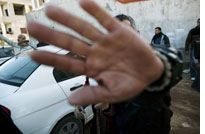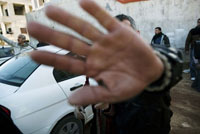News from the Committee to Protect Journalists, May 2012
CPJ highlights World Press Freedom Day

In a new report marking World Press Freedom Day, CPJ listed the world’s top 10 most censored countries, where dictatorial control over news coverage is achieved through a combination of propaganda, brute force, and sophisticated technology. Eritrea, North Korea, and Syria topped the list, underscoring the fact that domestic restrictions on information have broad implications for global geopolitical stability.
CPJ also participated in World Press Freedom Day activities around the globe, from Mexico City to Rabat. CPJ Executive Director Joel Simon spoke about combating impunity at an event at the United Nations Headquarters in New York, which was hosted by the French and Greek missions to the U.N. The event marked the fifth anniversary of a U.N. resolution to protect journalists working in conflict zones and sought to assess journalist security and map a way forward. In a video message, Simon reflected on the resolution and its importance, and the need to prioritize journalist security.
Elisabeth Witchel, CPJ’s U.K.-based Impunity Campaign consultant, also participated in a panel discussion marking the opening of a photo exhibition in London. The event, which documented the fight for a free press in Mexico through photography, was developed by the U.K.-based aid agency CAFOD in collaboration with CPJ and The Guardian.
CPJ Asia Program Coordinator Bob Dietz participated in a video panel discussion, organized by the U.S. Embassy to Sri Lanka and the Maldives, in which he spoke about the right to information and the pivotal role of free expression in the Sri Lankan reconciliation process.
Defending free speech in the Americas
CPJ has launched a new campaign, Critics Are Not Criminals, which focuses on governments’ use of criminal defamation laws to silence dissent in the Americas. In Ecuador, for example, more than 20 lawsuits against news outlets have prompted the press to self-censor “out of fear that local or national authorities will feel offended and go after journalists with costly lawsuits and fines,” the Knight Center for Journalism in the Americas reports.
Critics Are Not Criminals will highlight the region’s abuses of press freedom through social media, including Twitter, with the hashtag #defamation. Join CPJ in spreading awareness of key legislation and press freedom cases by following the CPJ Americas program on Twitter, @cpjamericas, or visiting the campaign online.
Supporting journalist safety around the world
CPJ partnered with Columbia University’s Graduate School of Journalism for a two-session panel, “Journalist Security On-Site and Online,” which drew more than 80 attendees and featured leading security experts such as Stuart Karle, Chief Operating Officer of Thomson Reuters, and Carolyn Cole of the Los Angeles Times, and digital experts such as Chris Soghoian, a privacy activist working as an Open Society Fellow, and Danny O’Brien, CPJ’s Internet advocacy coordinator.
CPJ research shows that governments have become sophisticated at putting journalists under online surveillance and committing assaults against them. In direct response to this trend, the experts at the panel highlighted aspects of CPJ’s Journalist Security Guide, released April 26, and described some of the precautions that journalists should take while reporting around the world.
Frank Smyth, CPJ’s security adviser, also participated in a journalist security discussion at London’s Frontline Club, where reporters, editors, and photographers discussed the security risks they face in the field–especially when working as freelancers.
CPJ’s Journalist Security Guide is available online in Arabic, English, Spanish, and French, and is also available for download on iBook and e-reader.
Introducing CPJ Debrief: A discussion series with frontline journalists
CPJ kicked off a new event series in New York with Jeffrey Gettleman, East Africa bureau chief for The New York Times and winner of the 2012 Pulitzer Prize for international reporting. The event drew a capacity crowd to The Half King, a local pub established by journalists Sebastian Junger, Scott Anderson, and Nanette Burstein.
Gettleman recounted his experiences reporting in Somalia, Africa’s deadliest country for the press, according to CPJ research. With a slideshow produced by the Times providing a vivid visual background, he spoke about the emotional costs of covering the 2011 famine, tentative prospects for securing stability in the country after decades of factional fighting, and ways to interview a Somali pirate without getting kidnapped. Forty-one journalists have been killed in Somalia over the past two decades, while dozens of local reporters have fled into exile, CPJ research shows.
As host of Eurovision, Azerbaijan must improve press freedom record
Once Azerbaijan was chosen as the host for this month’s Eurovision song contest, CPJ stepped up its calls for authorities to improve the country’s dismal press freedom record. Nina Ognianova, CPJ’s Europe and Central Asia coordinator, and members of other free expression organizations participated in a workshop on freedom of the press in Azerbaijan, hosted by the European Broadcasting Union, and issued a joint letter detailing the country’s history of press freedom abuses and listing the journalists who languish in Azerbaijani jails.
The International Partnership Group for Azerbaijan, a coalition of free expression organizations including CPJ, also launched a website and profiles on Facebook and Twitter, which highlight the country’s long-standing record of free speech violations. In 2011 alone, CPJ documented attacks against six reporters and the obstruction of four others in the country.
Testifying on jailed journalists in Central Asia
Muzaffar Suleymanov, CPJ’s research associate for the Europe and Central Asia program, spoke earlier this month at a hearing on Europe’s political prisoners at the U.S. Commission on Security and Cooperation in Europe (the U.S. Helsinki Commission). In a testimony intended to get U.S. policies to focus on press freedom violations ongoing in the region, Suleymanov called on world leaders to “hold Central Asian regimes responsible for denying global access to information by throwing critical reporters behind bars.”
Uzbekistan, sixth on CPJ’s Most Censored list, is currently holding Muhammad Bekjanov and Yusuf Ruzimuradov, two journalists who, imprisoned since 1999, have been jailed longer than any other reporter worldwide, according to CPJ research. In Kyrgyzstan, journalist Azimjon Askarov has received a life sentence on fabricated charges, all in retaliation for his reporting.
CPJ helps Somali journalist win freedom
When a radio director in Puntland was arrested in March for his coverage of clashes between government officials and Al-Shabaab militants, CPJ alerted the international community to the news and met with Puntland officials on two occasions to advocate for his release. The director, Awke Abdullahi, who spent 57 days in prison, was released in May.
Prior to Abdullahi’s arrest, police officers had raided his station, Voice of Peace, shut down the office, and confiscated materials. CPJ has documented the efforts of Puntland security forces to prevent journalists from reporting on unrest in the region.
In Togo, police return journalists’ equipment
The equipment of two journalists, which had been seized by Lomé police in April, was returned this month after CPJ contacted government officials about the confiscation. In an email thanking CPJ, Noel Kokou Tadegnon said the Togolese officials had apologized to them and promised to avoid confiscations and assaults on journalists in the future.
Tadegnon and Alli were attacked while covering an anti-government march on Togo’s Independence Day celebration.
Upcoming events
CPJ is partnering with Internews in Washington, D.C., for a panel discussion on journalist security on June 13. The panel will feature Frank Smyth and Danny O’Brien, the authors of CPJ’s Journalist Security Guide, along with Washington Post senior correspondent Rajiv Chandrasekaran. To RSVP for the event, visit http://journalistsecurity.eventbrite.com.
On June 20, World Refugee Day, CPJ will release its 2012 Journalists in Exile report, which highlights countries where journalists are forced to flee persecution for their reporting. In its 2011 report, CPJ found that nearly 70 journalists had fled their countries in the past 12 months, with imprisonment, or the threat of it, being the leading cause of their exile.
CPJ is collaborating with Human Rights Watch and screening three films at the Human Rights Watch Film Festival, from June 14 through 23. The films, Words of Wisdom, Silenced Voices, and Reportero, will premiere at Lincoln Center. Carlos Lauría, CPJ Senior Americas Program Coordinator, will be participating in a panel discussion for the June 23 showing of Reportero with filmmaker Bernardo Ruiz and Sergio Haro, the film’s subject.
Tickets are on sale to the public.
Donate
CPJ’s Distress Fund provides emergency grants to journalists facing persecution for their work. Support our work and give a gift today.
Blog highlights
Nigerian journalists obstructed on world press freedom day
China ducks questions about Al-Jazeera expulsion
Most censored nations each distort the Net in own way
Don’t get your sources in Syria killed
